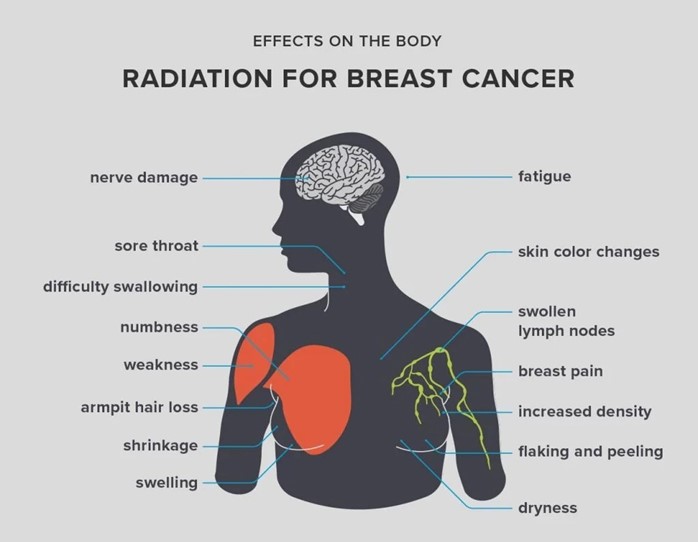A nurse is preparing a client for radiation treatment who is postoperative following a mastectomy. The nurse should inform the client to expect which of the following adverse effects from the treatment?
Diarrhea
Anorexia
Fatigue
Alopecia
The Correct Answer is C
Choice A: Diarrhea is not the correct answer because it is not a common adverse effect of radiation treatment for breast cancer. Diarrhea is a condition that causes loose, watery, or frequent stools. It can be caused by various factors such as infection, medication, or food intolerance. It is more likely to occur as an adverse effect of radiation treatment for cancers that affect the digestive system, such as colorectal or stomach cancer.
Choice B: Anorexia is not the correct answer because it is not a common adverse effect of radiation treatment for breast cancer. Anorexia is a condition that causes loss of appetite or interest in food. It can be caused by various factors such as depression, stress, or nausea. It is more likely to occur as an adverse effect of chemotherapy or other systemic treatments for cancer that affect the whole body.
Choice C: Fatigue is the correct answer because it is a common adverse effect of radiation treatment for breast cancer. Fatigue is a condition that causes extreme tiredness or exhaustion that is not relieved by rest or sleep. It can be caused by various factors such as anemia, inflammation, or pain. It is a common adverse effect of radiation treatment for any type of cancer, as radiation can damage healthy cells and tissues and affect the body's energy production.
Choice D: Alopecia is not the correct answer because it is not a common adverse effect of radiation treatment for breast cancer. Alopecia is a condition that causes hair loss or thinning on the scalp or other parts of the body. It can be caused by various factors such as genetics, hormones, or infection. It is more likely to occur as an adverse effect of chemotherapy or other systemic treatments for cancer that affect the whole body.

Nursing Test Bank
Naxlex Comprehensive Predictor Exams
Related Questions
Correct Answer is D
Explanation
Choice A:This response suggests that a physical examination is necessary before providing contraceptive advice. While a healthcare provider may conduct a physical examination as part of comprehensive care, making it a prerequisite for discussing contraception can create barriers for adolescents seeking information. Emphasizing a physical exam may deter open communication, as adolescents might feel apprehensive or judged. Effective contraceptive counseling should prioritize building rapport and understanding the individual's needs and concerns before proceeding to clinical
Choice B: "You are so young. Are you ready for the responsibilities of a sexual relationship?" This response is inappropriate and judgmental because it implies that the client is too immature or irresponsible to have a sexual relationship. It also discourages the client from seeking help or information from the nurse and may make her feel ashamed or guilty about her sexuality.
Choice C: "Because of your age, I think that a barrier method would be the best choice." This response is inappropriate and paternalistic because it assumes that the nurse knows what is best for the client without considering her individual situation or preferences. It also limits the client's options and may not address her specific needs or concerns.
Choice D:This response is appropriate as it seeks to gather more information about the adolescent's sexual activity, which is crucial for providing tailored contraceptive advice. Understanding the individual's sexual behavior, frequency of activity, number of partners, and risk factors allows the healthcare provider to recommend the most suitable contraceptive methods and address any concerns about sexually transmitted infections. The Centers for Disease Control and Prevention highlight the importance of personalized counseling that takes into account the adolescent's specific circumstances to promote effective contraceptive use and sexual health.

Correct Answer is A
Explanation
Choice A: "You seem scared to talk to your parents." This response is appropriate because it reflects the client's feelings and shows empathy and respect. It also opens the door for further communication and support from the nurse.
Choice B: "If you want me to, I can tell your parents for you." This response is not appropriate because it does not respect the client's autonomy and confidentiality. It also may make the client feel more anxious or helpless and may damage the trust between the client and the nurse.
Choice C: "Your parents will have to be told why you are being admitted." This response is not appropriate because it does not address the client's feelings or concerns. It also may sound harsh or threatening to the client, who may fear the consequences of telling her parents.
Choice D: "Give your parents a chance; they'll understand." This response is not appropriate because it does not acknowledge the client's feelings or concerns. It also may sound unrealistic or insensitive to the client, who may have valid reasons to doubt her parents' reaction or acceptance.
Whether you are a student looking to ace your exams or a practicing nurse seeking to enhance your expertise , our nursing education contents will empower you with the confidence and competence to make a difference in the lives of patients and become a respected leader in the healthcare field.
Visit Naxlex, invest in your future and unlock endless possibilities with our unparalleled nursing education contents today
Report Wrong Answer on the Current Question
Do you disagree with the answer? If yes, what is your expected answer? Explain.
Kindly be descriptive with the issue you are facing.
